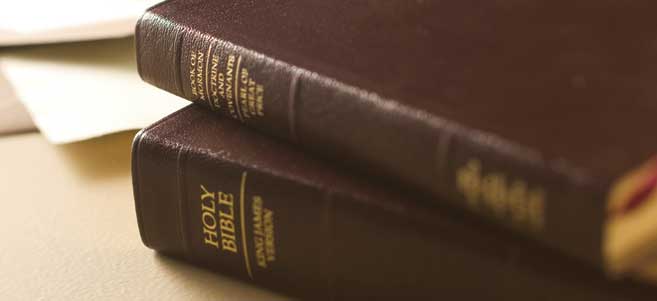
General Conference Odyssey post: October 1979, Sunday Morning session
Howard W. Hunter, then Elder and future prophet, teaches us how reading the very word of God will help us to know Jesus Christ.
A lot of us struggle with finding time to read our scriptures. And when we finally get to it, it’s often to simply get an assignment or goal completed. I know. I’ve been that person. But now that I’m older, I see the wisdom of a true study of the scriptures and wish I had used them to guide my life better and earlier.
Here are four suggestions, some from Elder Hunter and some from me, that can help make scripture reading more meaningful:
Schedule a Set Time as Opposed to a Set Number of Chapters to Read
This is great advice from Elder Hunter. Trying to get through a certain number of chapters defeats the purpose of true study. Sometimes, you’ll run across a verse that begs you to understand it fully, which may take some time. Elder Hunter suggests half an hour to one hour as a good amount of time to spend in the scriptures. He also says consistency pays off. So, this is a personal decision we all have to figure out on our own.
understand it fully, which may take some time. Elder Hunter suggests half an hour to one hour as a good amount of time to spend in the scriptures. He also says consistency pays off. So, this is a personal decision we all have to figure out on our own.
There are certainly various ways to read scripture and you are free to do as you feel is right, but don’t be afraid to vary your scripture reading either. I was once challenged to read the Book of Mormon in two weeks and I made it! While raising a houseful of children, too! And it gave me a whole different perspective of the book that I’ve always remembered and gained from. I only have to do that once, though. I much prefer reading it slowly and using my time to ponder in detail some of the great messages that are in that precious book.
Keep a Record of Questions You Have So You Can Ponder Them at Your Leisure
This is something I’ve learned that has become a great pleasure to me. These questions sit in the back of my mind and invariably I will experience something that triggers inspiration and answers directly related to this question. Or, I’ll raise this question in conversation with my husband or friends and end up with a wonderfully fulfilling discussion as I’ve been edified and shared the edification process with others.
I want to clarify that there are good questions and there are bad questions. And some good questions can turn bad and vise versa. Avoid this! Use your questions to seek better understand and enlightenment. Your goal is to know your Savior better and to love Him more.
Use Your Set time in Meaningful Ways
Reading straight through the scriptures is okay, but stopping to really think about a particular story, verse, or doctrine is certainly worth your time. Use this time to focus on one verse that stands out to you. Check thoroughly all the cross-references, follow the direction inspiration takes you, and take the time to ponder. If you learn something fantastic, my advice is to write it directly into your scriptures, somewhere in the margin. Otherwise, you’ll never remember this fantastic piece of inspiration you once were so excited about.
Something else I like to do is search the Internet. I’ll do a general search for whatever added meaning I am seeking. I’ve learned some interesting things written by people of other religions that give me a new perspective and deeper understanding. I follow this search by searching again the same topic but adding “LDS” in the search bar. Typically, the church or BYU will have something to say about this topic and of course, there are more interesting things to learn there.
Note: I have sometimes happened on Anti-Mormon sites doing this and as soon as I recognize what I’m reading, I get out of there. This is not where to find the answers I’m seeking, and I’m not interested in their answers anyway.
Take Time to Imagine the Scriptural Scene
In his talk, Elder Hunter describes the process of discovering the scriptures by using the story of Christ healing Jairus’ daughter. He urges us to take the time to imagine the scene  in our own mind’s eye. Use the descriptions given and logically fill in the holes creating a more personal story.
in our own mind’s eye. Use the descriptions given and logically fill in the holes creating a more personal story.
He emphasizes that Jairus is just a blip in the scriptures, a mere mention that offers great insight into the Savior’s life as well as those He served. But when you read the account (Mark 5) you’ll see that on His way to Jairus’ house He will heal the woman with the issue of blood. She’s an even smaller blip, but her story is much more known and dear to us.
Taking the time to study the very word of God and His stories (both great and small) will give us so much more in return, I so testify.
Other posts:
Rolling waters Marilyn Nielson